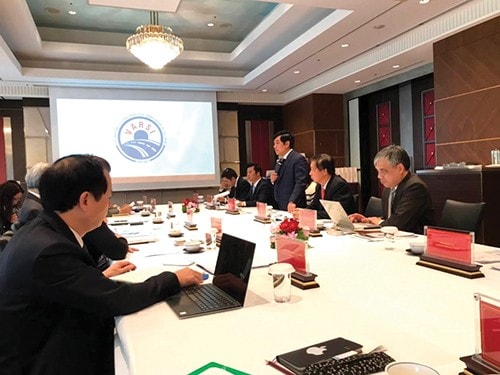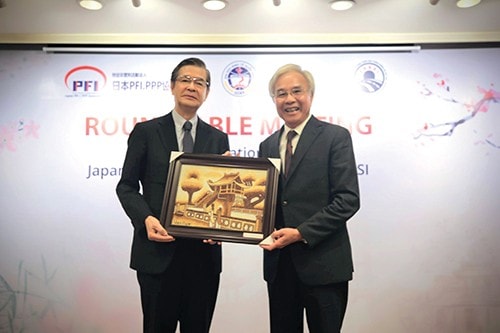Building a new PPP based on ability of liquidity
Hạ tầng - Ngày đăng : 23:55, 09/03/2020
From Japan’s PPP method…
In the friendly open atmosphere in February 11th, 2020 in Hanoi, Assoc. Prof. PhD Tran Chung- VARSI President raised a lot of questions to Kazuo Ueda- JPPA Chairman, a member of Japan PPP Board.
In the working session, VARSI actively raised a number of questions: in publicprivate partnership (PPP): there are many contracts carried out in different forms, in Japan, forms of PPP are adjusted by a law or a number of relevant laws? And responsibilities from State’s organizations (the Government, the Ministry of Finance, banks and local authorities) in carrying out PPP? Principles and regulations in sharing interests and risks between the Government and investors? Rights and duties of the Government side in contract relationship with investors to ensure equality among sides in contracts? Experience to deal with breach of contracts when a State’s organization breaks a contract?
Then Assoc. Prof. PhD Tran Chung also asked Ueda a number of questions: responsibilities of investors in Japan to a project enterprise in case the enterprise breaks the contract; responsibilities of State’s offices in solving disputes of interests between investors and people in the process of construction and operation; Japan’s experience in attracting loans and idle capital in the society.

Many questions in the field of PPP were raised by the VARSI’s members and then were answered clearly in the meeting in Tokyo in February 19th, 2020.
Kazuo Ueda- JPPA Chairman outlined the developments of Japan’s PPP and exchanged knowledge and experience he has accumulated since the JPPA was founded 20 years ago. In Japan, forms of PPP have been well developed and supported by people for its efficientcy and its realistics features. At the same time, Japan’s Government’s transparency makes people trusted, they always accompanies investors in building practical works with high economic-socio values for the society and they are willing to share difficulties and challenges in the progress of construction and operation.
In 2019, Japan had 823 PPP projects out of 2,000 projects of all sizes in various fields. The policy of bringing private sector into public sector is to eliminate stagnation, cut cost, speed up progresses and aim at the best utility services. When there are disputes in calculating profits or when there are risks, besides private enterprises’ plans and general financial projects, there are guarantee from the government and banks. Japan has its old model of PFI, which is different from Europe’s PPP.
Ho Minh Hoang- President of Deo Ca Group JSC.- the founder, investors and current Deputy Standing President of VARSI Board of Consultants said: “Through exchange, we have a better look to consider and compare reality of PPP form in Vietnam and in other countries in the world, and we can learn from good sides to apply them efficiently in Vietnam. Eliminating weak investors and offering policies of priority to Japan’s local investors are experience Vietnam should learn to have better sustainable developments”.
On February 21st, 2020- the fourth working day in Japan, VARSI delegation visited traffic works in Aichi province and had discussion on matters of bidding, receiving and managing express way projects in form of PPP with Aichi Road Project Limited Co. Hiroshi Tsuge- General Director of the company- said the progresses of bidding and managing the projects of express ways in Aichi in particular and in Japan in general are open and transparent in bidding evaluation.
Hiroshi also said in Japan there is accompanying from authorized State’s office in every stages of the project. Particularly, in BOT contracts, there are clear and detailed agreements on sharing risks and there are plans and predictions of relevant matters to the projects ensuring synchronous development of traffic system and investors’ developments. In case, the income is lower than it is planned, the Government will be responsible for the deficit.
To Vietnam’s PPP model
When being asked about building a PPP model for Vietnam, Kazuo Ueda insisted the law building should be suitable to economic and cultural conditions of each country. He has been invited by Thailand and Korea governments for consulting on PPP projects. He has recently been invited by China to give lecture on the matter.

“Vietnam’s drafted PPP should connect the matter with real conditions of Vietnam’s economy, people and culture. Therefore each country should have its own PPP mechanism, not a copy from other countries. Without considering it, Indonesia and Malaysia faced with failures after 10 years issuing PPP law. We have to learn from their failures,” said Ueda.
Ueda found that Vietnam should choose a PPP model which is suitable for Vietnam’s practical economy and people. European PPP building method is trying to keep the cost and cut down quality. Ueda showed many PPP projects in Europe and even in the U.S doomed in failure…
Experience suggested by Ueda is building a new PPP based on ability of liquidity. This is a suggestion for Vietnam’s lawmakers: building on the easiest payback and the lowest cost project.
From lessons in the field of infrastructure investments in Vietnam, from experience from other countries, it is expected that VARSI will lend a helping hand to solve difficulties in the current PPP investment environment to develop traffic infrastructure- a lever for the country’s socio-economic developments.
